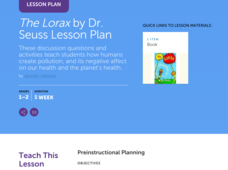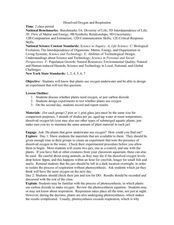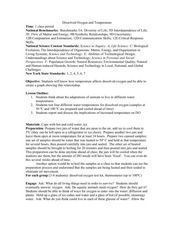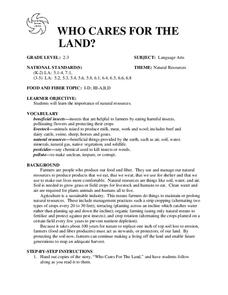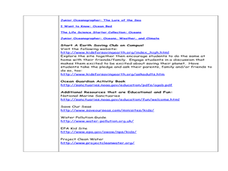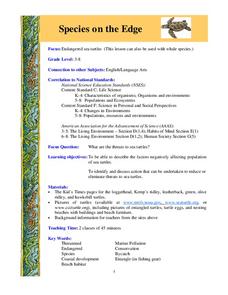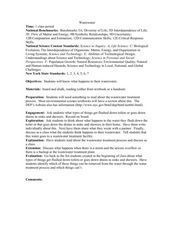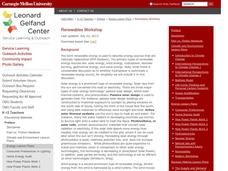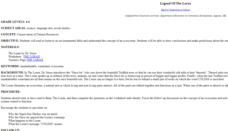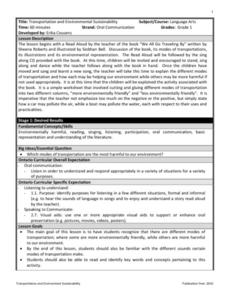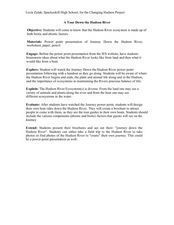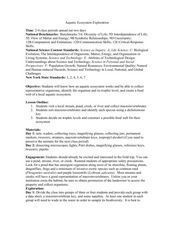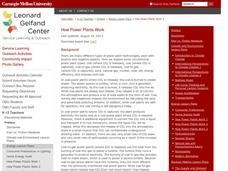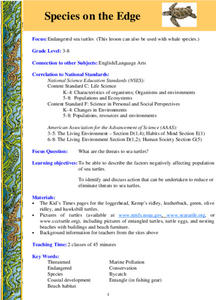Curated OER
Runoff: Intro to Watersheds
Students are taught that a watershed is, what types of basic land cover are impermeable and permeable to water. They trace the flow of water around their school and around their home. Students determine what watershed their school is a...
Scholastic
The Lorax by Dr. Seuss Lesson Plan
Celebrate the whimsical world of Dr. Seuss with a lesson that features the memorable tale of The Lorax. After listening to a riveting read-aloud, scholars take part in a grand conversation about the story and environment. Then they...
Curated OER
Not So Neutral Views
Students explore ways to use indicators to distinguish between acids and bases. They conduct an experiment to model and discuss the harmful effect of acid rain in our living and non-living environment.
Curated OER
Rice Farming
Third graders investigate how farmers get more rice from their land. In this farming lesson, 3rd graders discover things that farmers to do produce more rice. Students study photosynthesis and illustrate pictures about it. Students test...
Curated OER
Dissolved Oxygen and Respiration
Students are presented with the question, "Do plants that grow underwater use oxygen?" They create an experiment to test the presence of dissolved oxygen in the water using provided materials. Student experiments include a control jar as...
Curated OER
Dissolved Oxygen and Temperature
Students are shown how temperature affects dissolved oxygen and they create a graph showing this relationship. They think about the adaptations of animals to live in different water temperatures. Students test four different water...
Curated OER
Evaporation and Condensation
Young scholars explore how temperature affects the processes of evaporation and condensation.
Curated OER
WHO CARES FOR THE LAND?
Students explore the importance of natural resources. They are given copies of the story, "Who Cares For The Land," and students follow
along as the teacher reads it. Students identify the key points in the story. (Soil, water and air...
Curated OER
I Can Preserve My Planet
Students explore renewable and nonrenewable resources. For this ocean preservation lesson, students use KWL charts to understand ways the ocean is important to our daily lives. Students create a poster or wirte a letter to someone...
Curated OER
Species on the Edge
Students examine sea turtles. In this endangered species lesson, students analyze sea turtle habitats. Students hypothesize why sea turtles could go extinct.
Curated OER
Wastewater
Students discuss what happens to their wastewater. They read about the wastewater treatment process. Students are asked what types of things get flushed down toilets or goes down drains in sinks and showers. They are taught what happens...
Curated OER
Clean, Green Power
Students explore and discuss alternative energy sources, and identify disadvantages of current fossil fuels.
Carnegie Mellon University
Renewables Workshop
Youngsters examine resource maps to find out which states are using solar and wind power and discuss as a class various other renewable energy sources. They use a provided data table to record pros and cons to each technology, build and...
Curated OER
Legend of The Lorax
Students explore ecosystems. They read or listen to Dr. Seuss' The Lorax to draw conclusions and make predictions about the environmental impact and use of resources. They write poems about real forests and the wildlife which inhabit...
Curated OER
Transportation and Environmental Sustainability
After listening to the book, We All Go Traveling By, 1st graders discuss different modes of transportation that they see out in the world, and the environmental impacts of each one. Kids work together to create a list of the types of...
Japan Society
Nature and the Environment in Postwar Japan
Japan has a complex relationship with the environment. Explore this relationship with your class through this resource. Included are thought questions, several activity ideas that range from writing, to discussion, to research, and an...
Curated OER
A Tour Down the Hudson River
Learners discuss how the Hudson River is an ecosystem made up of both biotic and abiotic factors. They view the PowerPoint the Journal Down the Hudson River. Students become aware of where the Hudson River begins and ends, the plant and...
Curated OER
Zebra Mussel Population Simulation
Students are taught how to format and enter data into an Excel spreadsheet. They make a graph, and interpret graphed data. Students discuss the possible impacts of zebra mussels on the Hudson river. They graph zebra mussel data.
Curated OER
Aquatic Ecosystem Exploration
Students visit a local stream, pond, creek, or river and collect macroinvertebrates. They sort macroinvertebrates and identify each species using a dichotomous key. Students decide on trophic levels and construct a possible food web for...
Curated OER
Invasives and Marsh Birds
Students are taught that invasive plant removal can have a variety of impacts. They are shown this by using graphs. Students view maps of vegetation change on Iona Island. They discuss implications of changes on marsh birds using data...
Curated OER
Land Use Change Introduction
Students discuss the major changes that have taken place in the Hudson Valley over the past 400 years. They use aerial photos to describe major trends in Dutchess County. Students view a PowerPoint presentation. They work in small groups...
Carnegie Mellon University
How Power Plants Work 2
In this second of three lessons on power plants, future engineers find out how we generate electricity and how coal-powered plants operate. They work in small groups to make electromagnet generators to light LED bulbs. A set of...
Carnegie Mellon University
How Power Plants Work 3
Double, double toil and trouble, fire burn and cauldron bubble! Find out what drives a turbine to generate electricity and whether or not it has an impact on the environment. A discussion and lecture is divided by a hands-on activity in...
Curated OER
Species on the Edge
Students describe factors negatively affecting population of sea turtles, and identify and discuss action that can be undertaken to reduce or eliminate threats to sea turtles and other endangered species.
Other popular searches
- Water and Air Pollution
- Water, Air Noise Pollution
- Water Land Air Pollutants
- Water and Air Pollutants
- Water Air Noise Pollution
- Land Air and Water Pollution
- Pollution of Air and Water



